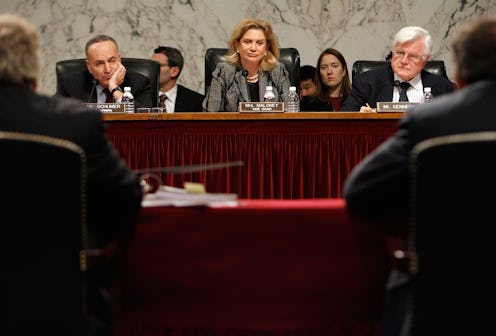
While the rhetoric about women coming from the White House might seem shocking, a recent report stated that women in politics say the challenges and sexism that female lawmakers face are nothing new.
For the study, released by the Center for American Women in Politics and Eagleton Institute of Politics at Rutgers University, researchers interviewed 83 women serving as senators and representatives from the 114th Congress, which was in session from 2015-2016, on how they viewed their roles in Congress. That year, only 20 women served in the Senate and 84 in the House, and in total, 19.4 percent of all members of the 114th Congress were female.
Common takeaways from the study were that women are more likely to work across party lines, more results-oriented, and more concerned with achieving policy outcomes, rather than publicity, compared to their male counterparts. But — and despite many positives — there was also a common theme: getting into office as a woman is significantly more challenging, and, once in office, they must work harder than men to be considered equals.
"People are not used to seeing women in these positions," said Democratic Rep. Kathleen Rice of New York in the report. "So we have to work twice as hard to prove ourselves."
Many women acknowledged that they struggle to be heard in congressional spaces. They are judged for their style, rather than the substance of their policies, and must juggle the demands of work and family life.
"[Congressmen] put the suit on ... and get in front of a microphone and debate an issue," said former Republican Rep. Renee Ellmers of North Carolina. "When we do it, it's, 'Wow, what's that all about? She's got nice shoes on.'"
But, despite the mounting difficulties, they also acknowledged a slew of positives — particularly their commitment to being a "voice for the voiceless," and representing the country's most marginalized communities, from the economically disadvantaged to immigrants and people of color.
They considered their role in Congress as critical, particularly during a decisive political climate with partisan divides and legislative gridlock.
"It was always about expanding opportunity and freedom [while we were the majority]," said House Minority Leader Nancy Pelosi. "To recognize the dignity and worth of every person — that was an important role for women to play ... I think that part of the legacy of women in Congress is not only the promotion of women in a large percent of our population here, but how we expand the opportunity for everybody."
While the women said they must work harder than men, nearly all of the women interviewed agreed that they were making a difference in office and advocating on behalf of the issues and communities they cared about. For instance, Democratic Rep. Dina Titus of Nevada is committed to helping people who are here as immigrants, while Democratic Rep. Carolyn Maloney of New York and Republican Rep. Marsha Blackburn of Tennessee united to help pass the National Women's History Museum bill.
"[Women] want to make a difference, not that men don't, but we are leaving our homes, we are leaving our families and we are coming here and saying, 'I want to fight for x. I'm leaving my whole world because I'm that passionate about it,' " said Republican Rep. Jackie Walorski of Indiana. "Women are driven by passion, and they are very effective."
"You have to be aware that you're a role model for women, and that's something that I've taken to heart," said Republican Rep. Elise Stefanik of New York. "And I'm constantly meeting with young women to reach out to our office, whether they're from the district or they get in contact from across the country, to encourage them to step up to the plate and add their voices to the conversation."